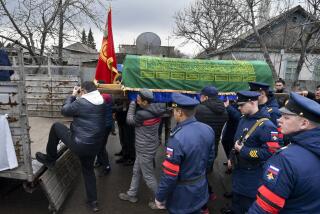In Central Asia, Dreams of an Islamic State
- Share via
KARA SUU, Kyrgyzstan — Four-year-old Abubakir says that when he grows up he will become a caliph -- the ruler of an Islamic theocratic empire.
For now, he is content to run around pretending to be an airplane while his father, Ayub Mashrapov, a member of a radical Islamic group, sees off friends at a dusty railway station.
Kara Suu, which means Black Water, is split by the border between Kyrgyzstan and Uzbekistan, two former Soviet republics in Central Asia -- a strategic region that has significant natural resources but is poor and unstable.
In the Soviet era, few children here dreamed of becoming caliphs. State propaganda encouraged them to become cosmonauts, or model workers at factories and collective farms. For a Muslim child, religion was mostly about following rituals and traditions at funerals and weddings.
Fifteen years after the collapse of the Soviet Union, the mosque is a place where many of the 22,000 people of Kara Suu seem to find hope for a more dignified life -- sometime in the future, when society is ruled by the laws of God, they say. Islamic extremism is attracting some supporters.
“Don’t forget that there is no authority except God,” Imam Alauddin tells worshipers at Friday prayers. The little mosque cannot hold all of them, so they lay down prayer mats outside.
In this mostly Muslim nation of 5 million, there is almost no manufacturing and the Soviet system of collective farms hasn’t been replaced with anything better since independence.
The place where residents of Kara Suu can eke out a living is its bazaar. It’s the biggest wholesale market in the Fergana Valley, which overlaps parts of Kyrgyzstan, Uzbekistan and Tajikistan.
Most wares come from neighboring China, which has become the main supplier of affordable consumer goods for Central Asia. The products are some of the cheapest available from Chinese factories and are of low quality. Many Central Asians despise them, but have no choice.
The space in front of the grimy bazaar bustles with people carrying bundles and porters pushing overloaded carts as cars make their way through.
Many of the vendors have other jobs, like teaching or farming, but that work doesn’t pay enough.
The bazaar is outlined by rows of railway shipping containers. They’re filled with nearly everything -- hairpins, toys, chewing gum, slippers, sinks and TV sets.
Most take away their loads to sell elsewhere in the valley.
Boys as young as 6 and 7 compete for customers who can pay a few coins for carrying their baggage. Some kids carry the goods by hand or on their backs. Others have small metal trolleys.
Competition is stiff, and the boys are persistent and cheeky as they try to attract customers.
“Do you want me to carry your bags?” they ask passersby. The boys cling to bag handles, boxes and bundles, ready to take over at any positive sign.
The bazaar isn’t immune to politics. Ownership has long been in dispute and one businessman was shot dead in September at his home. Two weeks later, a rival in the fight was gunned down in Bishkek, the capital of this fledgling democracy.
Last March, a largely nonviolent popular revolution ousted the country’s post-Soviet leader when protesters seized control of government buildings in the capital. Foreign monitors generally praised the conduct of a subsequent election in July that gave an overwhelming victory to a former opposition leader.
The new government has pledged to do better than the old one, which was accused of corruption, but it’s had a shaky start, with a wave of apparently politically motivated killings and sometimes violent protests. Some have accused the new president of nepotism.
Still, Kyrgyz consider themselves luckier than their neighbors in Uzbekistan because they at least can protest and criticize their government. The March revolution raised hopes among democratic activists in neighboring countries, and prompted Uzbek authorities to tighten their grip.
On the other side of the Fergana Valley sits Andijon, Uzbekistan, where in May protesters gathered at the main square to complain about abuses and poverty. Troops encircled them and opened fire. Human rights activists say hundreds died, including women, children and old people. Hundreds more fled to neighboring Kyrgyzstan.
Hundreds who stayed were arrested.
The protest was triggered by the trial of 23 businessmen who were accused of being religious extremists running a criminal organization. But many in Andijon considered them respectable business leaders who were also devout Muslims.
Supporters of the businessmen say they made Islamic principles the basis of their business community, setting up a fund to help colleagues in financial difficulty and agreeing to spend part of their profits to support the poor and elderly.
That approach posed a threat to the government, supporters say, offering people a better and fairer social order in contrast to the surrounding lawlessness and corruption.
Corruption and lawlessness have given democracy a bad name to many Uzbeks and Kyrgyz. They want some kind of hope and meaning to their lives. Many in Central Asia’s most miserable corners, like Kara Suu, are finding it in religion.
Another young man arrived at the Kara Suu train station carrying his young son. After greeting friends with traditional hugs, he asked his son what he will be when he grows up.
“A caliph,” the boy replied.
More to Read
Sign up for Essential California
The most important California stories and recommendations in your inbox every morning.
You may occasionally receive promotional content from the Los Angeles Times.













